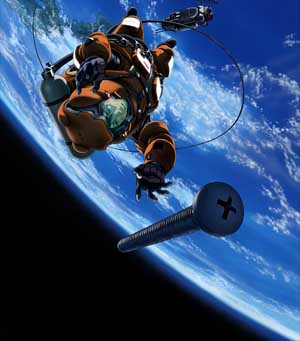“That’s one small step for [a] man, one giant leap for mankind.”
– Neil Armstrong
 Planetes |
The space age began in the 1950s with the Soviet Union’s launch of Sputnik 1, which was followed by a Space Race that lasted until the collapse of the Soviet Union. Without milateristic competition between our countries, all we had left was our curiosity to propel us to the stars. Apparently curiosity wasn’t as motivating a factor as fear, and NASA has seen increasing cuts in funding since the 1990s.
So the Space Age is now overshadowed by an Information Age, and some believe we are now too focused on looking inward instead of outward at the stars, but we do continue to explore space with unmanned probes, an International Space Station, and over 500 Functional Satelites. We are also looking for ways to get the market to jumpstart another space-race with competitions like Ansari X Prize.
So the human race’s advance into space continues at a steady pace; however, our enthusiasm for space exploration has waned. Gone is the hopeful idealism of human beings living among the stars that was once embodied in TV shows like Star Trek, which promoted a utopian vision of humanity’s future. Today’s futurist visions of human beings in space are much darker and pessimistic as we see in shows like Battlestar Gallactica and Firefly. We see this pessimism in a minority of voices who are opposed to space exploration:
While I don’t dispute that space exploration has resulted in some advances in science and technology, the resources invested should be used at home. Let’s fix the problems on Earth first before we invest billions of dollars into solving problems in space. Imagine if that money were to be channeled into finding cures for cancer or AIDS, or finding solutions for world hunger. Let’s fix Earth first before we conquer space.
For these reasons, a series like Planetes (Ancient GreeK for “Wanderers”) is so refreshing. The show follows a team working in the Space Debris Section of a corporate space station in 2075. The department was created for public relations after an errant bolt collided with and depressurized a passenger space craft, killing many people on board. Nicknamed “Half Section” because the company only gives them half the funding promised, the team rendevous with orbiting space junk to either collect it or nudge it to burn up in Earth’s atmosphere.
The Space Review has called Planetes “probably the most broad, detailed, and realistic televised vision of a near-term spacefaring future that has aired anywhere.” And we can see this in the way the show mirrors modern concerns. After people got over the military implications of China shooting down one of its old weather satelites with a missile, scientists were able to come out and complain about the very real threat all of the space debris the test had generated and presented future space travelers.
As the show correctly theorizes, the destruction of a large space station would produce an incredible amount of space debris, which would destroy other satelites, creating a chain reaction until so much debris surrounded Earth the space program would never recover. The more I learn about the subject, the more I realize that one could argue that we don’t need to worry about meeting warlike alien races in space, because such a race would fill its planetary orbit with so much debris that they would never be able to leave their planet.
Let’s not be that race.
 Planetes |
We are introduced to near-future space life by following Ai Tanabe as she joins Half Section. When she meets Hachimaki, her coworker, she can’t stop laughing about the fact that he is wearing diapers the same way people couldn’t get over the fact that astronaut Lisa Nowak wore diapers in her 900-mile drive to possibly kidnap a rival lover. Tanabe’s seemingly naive idealism is contrasted with Hachi’s apparent cynicism. I say “seemingly” and “apparent” because none of these characters are so simple.
Great characters, the human element of this story, is what makes Planetes so engaging. Upon first introductions to the Debris Section team, we meet a motley crew of apparent rejects. Through the episodes, however, we learn about the reasons behind each character’s idiosynchracies and come to understand them within the socioeconomic and political context of this futurist vision.
Planetes politics revolve around the International Treaty Organization (INTO). Major world-powers are never named, only refered to as First-World countries, because the story is tackling political problems that we are experiencing today without assigning blame. In Planetes’ future, the switch from oil as a fuel source has meant the complete collapse of countries who were major oil exporters. Citizens from Third-World countries have very little representation in space, and their attempts to break into the market are dismissed by established companies. On Earth, more people are dying of starvation and war than ever before, but the First-World has no part in it beyond delivering aid and peace-keeping troops. Planetes wisely takes no stand on any of these developments except to convey that the world is a complicated place with complicated problems, which humans will always try to tackle as best we can and it will always be so.
With these familiar issues, space travel brings new problems and opportunities. People who make their living in space die from all the problems that lifestyle brings such as brittle bones and cancer. People born in space can never visit Earth unless science figures out a way for their bodies to survive the increased gravity. A terrorist organization, the Space Defense Front, perpetually threatens to shut down space flight in their cause to bring attention back to the problems on Earth.
Still, the show manages to strike a very positive tone. Despite government and corporate corruption, space-related illnesses, terrorism, and the host of other problems the characters encounter, they manage to keep human life in space hopeful through their strong ethics, which are rooted in their humanistic idealism. Where other storytellers would focus on the pessimistic characteristics of this future and the detrimental effects they would have on the characters, Makoto Yukimura’s characters are too strong in their personalities and their ethics to let their environment drag them down.
The show successfully accomplished what no other series has managed to achieve since Star Trek left the airwaves. Despite the corruption and injustice the characters face in space, their virtuous perseverance, ethical standards, and vision allow them to overcome their challenges. The series provides an inspiring view of space travel. One that I hope will inspire others to start thinking about “out there” once again.
Comments
One response to ““Planetes” a Great Anime About Space Exploration”